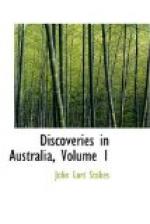Lieutenant Stewart gives as the general result of his observations, extending over about seventy or eighty miles, that there is abundance of fresh water on the Peninsula; that the South side is by far the finest and best watered country; that the trees are there free from the white ant; and that in a large tract of country, the cabbage-palm abounds. He also observes, that as much of the south coast as he saw, has a coral reef extending about a mile from the beach; and that the rise and fall of the tide is much greater than at Port Essington.
The natives were found by the settlers, as we have already stated, very friendly, and their assistance proved valuable: they brought in the head of the palm-cabbage, which makes an excellent vegetable, though to procure it, the tree is cut down and destroyed: they also supplied the party with wild honey. One of the Raffles Bay tribe instantly made himself known on the arrival of the Expedition in the Bay; he was called by the name of Alligator, on account of his huge teeth, though his proper appellation was Marambari.
From Lieutenant Vallach* of H.M.S. Britomart, I received much valuable information respecting the natives, whom I find to be divided in three distinct classes, which do not intermarry. The first is known as Maudrojilly, the second as Mamburgy, the third as Mandrouilly. They are very particular about the distinction of classes, but we could never discover which was the superior and which the inferior class, though it is supposed by most of those who have inquired into the subject, that the Madrojilly, or first class, head the others in war, and govern the affairs of the tribe.
(Footnote. Lieutenant Vallach died at Moulmain in 1841.)
These aborigines were certainly a fine race, differing in some matters from the other natives of Australia; their hair was neither curly nor straight, but crisp. The custom of extracting a front tooth prevails among them, while the nasal cartilage here as elsewhere was perforated. I noticed in particular that they did not make use of the boomerang, or kiley, but of the throwing stick or womera, of a larger kind, however, than any I have observed elsewhere; the head of their spears was made of stone. They have a smaller kind, chiefly used to kill birds and other animals at a considerable distance. They have also large heavy clubs, while the natives on the South coast carry only the short throwing stick.* They go wholly naked, except when entering the settlements, on which occasions they wear a few leaves. Their canoes were chiefly obtained from the Malays.




